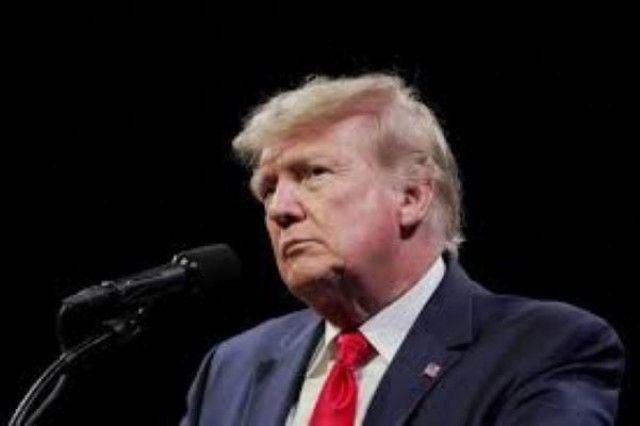A return to Trumponomics
Trump’s policies will put pressure on Chinese trade, may destabilise Pakistan

An economic policy shift may be on the horizon, from Bidenomics to Trumponomics, impacting both the US and the global economy. Former US President Donald Trump could introduce significant changes in economic policy if he wins the US presidential election on November 5. Trump, who has reportedly gained around 70% public support, may also benefit from increased sympathy votes following the recent assassination attempt on his life.
Trumponomics advocates for low interest rates, low taxes, and bringing businesses back to the US. Trump’s economic strategy calls for stimulating growth through tax cuts, reduced regulations, and developing the domestic economy. He also supports comprehensive tariff policies, imposing higher tariffs on imported goods to protect US industries and jobs, while taking strict measures to address US-China relations and exert pressure on Chinese trade.
Despite these efforts, it is unlikely that Trump can economically weaken China. China benefits from natural advantages such as cheap labour, abundant raw materials, and low production costs, making it difficult for any country to compete. China has even surpassed the US in cutting-edge technology due to substantial investments in scientific research.
Trumponomics, which includes strategies like raising import duties and providing subsidies and free energy to local companies, harks back to economic tools used 50 years ago. However, these strategies may be outdated in the current global economic landscape. If the US imposes high import duties on Chinese electric vehicles (EVs), they will become more expensive in the US, but China can simply export them to other countries. US consumers may pressure their government to eliminate these duties when they see lower prices for the same products abroad. Generally, Americans are more likely to afford Chinese-made items than those produced domestically.
Trump’s policies might lead to short-term economic stimulus, but they also pose long-term risks such as increased fiscal deficits, inflationary pressures, and economic uncertainty. His “America First” approach impacts both internal and external US affairs. Additionally, the US may face challenges and opposition due to the growing importance of globalisation and international cooperation.
The “America First” policy will likely face opposition and challenges. The US, a nation of immigrants, relies on cheap labour from migrants to fuel its economy. For instance, the US offers scholarships and bursaries to students who work at lower wages, contributing to economic growth.
Bloomberg quoted Trump as saying, “I can’t believe how many people are negative on tariffs that are actually smart. Man, is it good for negotiation?” Regarding Taiwan, Trump remarked, “I know the people very well, respect them greatly. They did take about 100% of our chip business. I think Taiwan should pay us for defence.”
Trump also aims to end the Russia-Ukraine war and potentially withdraw from NATO. He believes the US provides free security to NATO countries at a significant loss and insists that these countries should pay for their security or risk losing US protection. During his previous term, Trump demanded NATO countries pay for US security services.
The US has policies to contain China, finance the war on terrorism, stabilise its economy, and swindle Middle Eastern countries by selling arms. Current tensions support Israel’s efforts to occupy Gaza, escalating conflict in the Middle East. Iran remains steadfast and seeks revenge, putting Saudi Arabia in a weak position and likely to seek US assistance. US policies may benefit its citizens and India but harm the Muslim world.
Eminent economist and Research Institute of Islamic Banking and Finance Chairman Dr Shahid Hassan Siddiqui notes that US economic policy, based on capitalism, remains consistent regardless of the president. Current objectives include increasing tension in the Middle East, facilitating Israel’s occupation of Gaza, rising global terrorism, dividing the Islamic world, and destabilising Pakistan. The US aims to make India a strategic partner while involving Pakistan in the war on terror. This policy includes supporting elements in Balochistan and committing acts of terrorism in Pakistan.
Economic policies of past and present Pakistani governments have caused financial terrorism under the guise of International Monetary Fund (IMF) conditions, deterring foreign investment. Despite capitalism’s flaws, the West believes it must continue, with elite capitalists, particularly Jews, fixing issues by introducing social security measures to alleviate poverty in the West. If these incentives disappear, Trump’s policies could create problems for Pakistan and the Muslim world. Ultimately, the Pentagon or the US State Department shapes policies, maintaining the objectives of the great game unchanged, with India as a strategic partner to contain China.
Leading Economic Analyst and Researcher Prof Engineer Zamir Ahmed Awan states, “Donald Trump is a businessman driven by money, disregarding humanity and religion. He knows how to make money and during his previous term, he tried to end ongoing wars. For example, he acknowledged the US wasted billions in Afghanistan and negotiated with the Taliban, eventually reaching an agreement to withdraw US and NATO forces. Although the withdrawal was delayed, the credit goes to Trump for initiating the process.”
If Trump wins, his anti-war policies might bolster the global economy, although challenges remain. He previously withdrew from the Iran nuclear agreement in 2018, increasing pressure on Iran without sound reason. Trump’s approach suggests he harbours anti-Muslim sentiments and will continue pressuring Iran, China, and North Korea, while maintaining a unique understanding with Russia. He will adopt a policy of imposing sanctions on non-compliant countries and issuing threats, but will likely avoid full-scale war. This approach could bolster the global economy, as Trump aims to promote flourishing businesses.
THE WRITER IS A STAFF CORRESPONDENT



















COMMENTS
Comments are moderated and generally will be posted if they are on-topic and not abusive.
For more information, please see our Comments FAQ